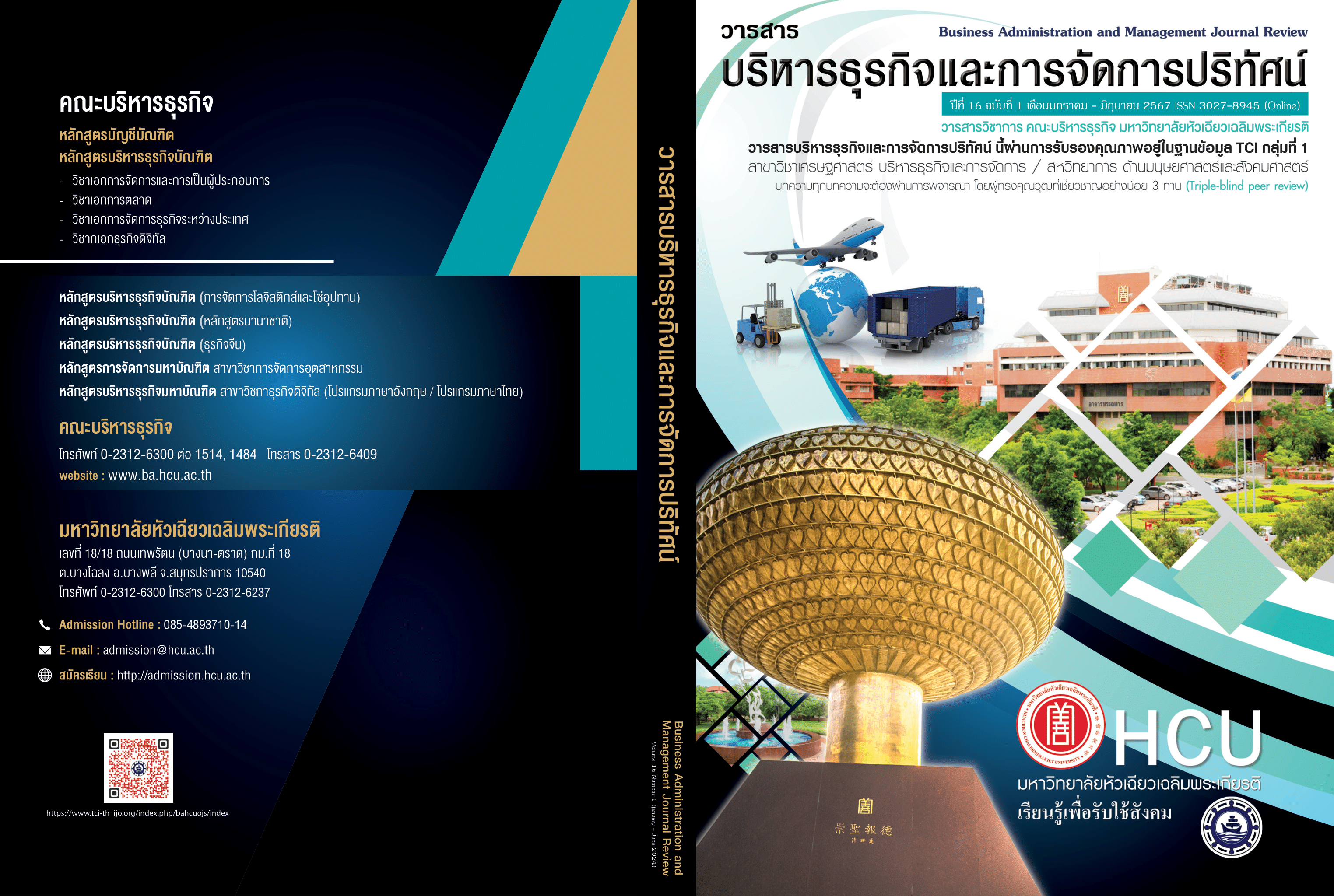Service-Oriented Organizational Citizenship Behavior of Frontline Employees of Hotels in Thailand
Keywords:
Service-Oriented Organizational Citizenship Behavior, Organization in Hotel Business, Frontline EmployeeAbstract
This research attempts to study the structural equation model of Service-oriented organizational citizenship behavior (SOCB) of frontline employee of hotel in Thailand which registered to The Thai Hotels Association (THA). They are comprised of 748 hotels which located on 4 main regions of Thailand. The amount respondents of this research are 452. The structural equation model (SEM) is a quantitative method applied to be the methodology of data analysis. Trust, perceived support, self-perception, and attitude are proposed to be independent variables. Leader-member exchange (LMX) proposed to be mediating variable. They are three objective of research 1. To initiate the predicted model for SOCB 2. To study the level of effects of psychological factor towards SOCB
The finding indicates that LMX mediates only the causal relationship between perceived support and SOCB. LMX not mediate the causal relationship between trust, attitude and self-perception and SOCB.
References
ระชานนท์ ทวีผล, ธีระวัฒน์ จันทึก และพิทักษ์ ศิริวงศ์. (2561). องค์ประกอบความเอาใจใส่พิเศษของพนักงานบริการในโรงแรมประเภทบูติคประเทศไทย. วารสารวิทยาลัยดุสิตธานี, 12 (ฉบับพิเศษ พฤษภาคม 2561). 18
Aizzat Mohd. Nasurdin, Noor Hazlina Ahmad and Cheng Ling Tan. (2015). High performance human resources practices, identification with organizational values and goals, and service-oriented organizational citizenship behavior; a review of literature and proposed model. SHS Web Conference. 18(2): 01001. From https://doi.org/10.1051/shsconf/ 20151801001
Alima Aktar and Faizuniah Pangil. (2017). The Relationship between Employee Engagement, HRM practices and Perceived Organizational Support: Evidence from Banking Employees. International Journal of Human Resource Studies. 7(3): 1-22. from https://doi.org/ 10.5296/ijhrs.v7i3.11353
Amir Riaz and Hafiz Zahid Mahmood. (2017). Cross-Level Relationship of Implemented High Performance Work System and Employee Service Outcomes: The Mediating Role of Affective Commitment. Pakistan Journal of Commerce and Social Sciences. 11(1): 351-373.
Anneswary Kalidass and Arsiah Bahron. (2015). The relationship between perceived supervisor support, perceived organizational support, organizational commitment and employee turnover intention. International Journal of Business Administration, 6(5), 82-89. from https://doi.org/10.5430/ ijba.v6n5p82
Azic, M. L. (2017). The impact of hotel employee satisfaction on hospitality performance. Tourism and Hospitality Management, 23(1), Page 105-117.
Basharat Javed, Abdul Karim Khan and Samina Quratulain. (2018). Inclusive Leadership and Innovative Work Behavior: Examination of LMX Perspective in Small Capitalized Textile Firms. The Journal of Psychology. 152(8): 594-612. from https://doi.org/10.1080/ 00223980.2018.1489767
Borralha, S., de Jesus, B. N., Pinto, P., & Viseu J. N. (2016). Hotel employees: A systematic literature review. Tourism & Management Studies, 12(1), 120-126.
Chao-Chan Wu and Na-Ting Liu. (2014). Perceived Organizational Support, Organizational Commitment and Service-Oriented Organizational Citizenship Behaviors. International journal of Business and Information. 9(1): 61-88. from https://doi.org/10.6702/ ijbi.2014.9.1.3
Chien-Peng Lin, Wei-Ting Hung and Chou-Kang Chiu. (2008). Being Good Citizens: Understanding a Mediating Mechanism of Organizational Commitment and Social Network Ties in OCBs. Journal of Business Ethics, 81(3), 561-578. from https://doi.org/10.1007/s10551-007-9528-8
Chien Mu Yeh. (2019). The relationship between tourism involvement, organizational commitment and organizational citizenship behaviors in the hotel industry. Tourism and Hospitality Management. 25(1): 75-94. from https://doi.org/10.20867/thm.25.1.10
Chun-hsi Vivian Chen and Rui Hsin Kao. (2012). Work values and Service-Oriented Organizational Citizenship Behavior: the mediation of psychological contract and professional commitment: A case of students in Taiwan Police College. Social Indicators Research. 107(1): 149-169. from https://doi.org/10.1007/ s11205-011-9832-7
Colwell, S., Scott, S. H., Jiang, D. & Joshi, A. (2009). Board and Sequential Interviews in Selection: An Experimental Study of their Comparative Effectiveness. Management Decision, 47(10).
Eka Risma Putri, Udin and Indi Djastuti. (2019) Structural Empowerment and Service-Oriented Organizational Citizenship Behavior: The Mediating Roles of Innovativeness and Job Satisfaction. Quality-Access to Success. 20(170): 112-117.
Gukdo Byun, Ye Dai and et al. (2017). Leader Trust, Competence, LMX, and Member Performance: A Moderated Mediation Framework. Psychological Reports, 120(6), 1137-1159. from https://doi.org/10.1177/0033294117716465
Jenell Wittmer, James Martin and Amanuel G. Tekleab. (2010). Procedural justice and work outcomes in a unionized setting: the mediating role of leader-member exchange. American Journal of Business. 25(2): 55-70. from https://doi.org/10.1108/ 19355181201000010
Ji Wena, Songshan (Sam) Huang and Pingping Hou. (2019). Emotional intelligence, emotional labor, perceived organizational support, and job satisfaction: a moderated mediation model. International Journal of Hospitality Management. 81: 120-130. From https://doi.org/10.1016/j.ijhm.2019.01.009
José Varela and Teresa García Garazo. (2006). Structural relationship between organizational service orientation contact employee job satisfaction and citizenship behavior. International Journal of Service Industry Management. 17(1): 23-50. from https://doi.org/10.1108/09564230610651561
Lance A. Bettencourt and Stephen W.Brown. (1997). Contact employees: relationships among workplace faimess, job satisfaction and prosocial service behavior. Journal of Retailing. 73(1): 39-61. from https://doi.org/10.1016/S0022-4359(97)90014-2
Lance A. Bettencourt, Kevin P. Gwinner and Matthew L. Meuter. (2001). A comparison of attitude, personality, and knowledge predictors of service-oriented organizational citizenship behaviors. Journal of Applied Psychology, 86(1), 29-41. from https://doi.org/10.1037/0021-9010.86.1.29
Ling Suan Choo, C. Subramaniam and N. Mat. (2018). Predicting Service-Oriented Citizenship Behaviour among Frontlines with Personal Resources Work Engagement: A Proposed Research Framework. Journal of Advanced Research in Social and Behavioural Sciences. 10(1): 74-79. from http://www.akademiabaru.com/ doc/ARSBSV10 _N1_P74_79.pdf
Jason A Colquitt, Brent A Scott and Jeffery A LePine. (2007). Trust, trustworthiness, and trust propensity: A meta-analytic test of their unique relationships with risk taking and job performance. Journal of Applied Psychology. 92(4): 909-927. from https://doi.org/10.1037/0021-9010.92.4.909
Mike W. Peng. (2014). New Research Directions in the Institution-Based View. Series: Research in Global Strategic Management. 16: 59-78 from https://doi.org/ 10.1108/S1064-4857_2014_0000016002
Misbah Hayat Bhatti, Yanbin Ju, Umair Akram and et al. (2019). Impact of Participative Leadership on Organizational Citizenship Behavior: Mediating Role of Trust and Moderating Role of Continuance Commitment: Evidence from the Pakistan Hotel Industry. Sustainability. Vol.11 (4), 1170. from https://doi.org/10.3390/su11041170
Myriam Chiniara and Kathleen Bentein. (2018). The servant leadership advantage: When perceiving low differentiation in leader-member relationship quality influences team cohesion, team task performance and service OCB. The Leadership Quarterly. 29(2): 333-345. from https://doi.org/10.1016/ j.leaqua.2017.05.002
Nancy J. Sirianni, Iana Castro-Nelson and et al. (2009).The influence of service employee characteristics on customer choice and post-choice satisfaction. Advances in Consumer Research. 39: 965-967.
Nazanin Naderiadib Alpler and Huseyin Arasli. (2020). Can Hindrance Stressors Change the Nature of Perceived Employability? An Empirical Study in the Hotel Industry. Sustainability. MDPI. Open Access Journal. 12(24): 1-13. from https://doi.org/10.3390/ su122410574
Panagiotics V. Kloutsiniotis and Dimitrios M. Mihail. (2020). The effects of high performance work systems in employees’ service-oriented OCB. International Journal of Hospitality Management. 90(4). from https://doi.org/10.1016/ j.ijhm.2020.102610
Qing Miao, Alexander Newman and Xu Huang. (2014). The impact of participative leadership on job performance and organizational citizenship behavior: Distinguishing between the mediating effects of affective and cognitive trust. The International Journal of Human Resource Management, 25(20), 2796-2810. from https://doi.org/10.1080/09585192.2014.934890
Qinxuan gu, Thomas Li-Ping Tang and Wan Jiang. (2015). Does moral leadership enhance employee creativity? Employee identification with leader and leader-member exchange (LMX) in the Chinese context. Journal of Business Ethics. 126(3): 513-529. from https://doi.org/10.1007/s10551-013-1967-9
Richard Sweeney. (2006). Millennial Behaviors & Demographics. University Librarian, New Jersey Institute of Technology. from http://unbtls.ca/ teachingtips/pdfs/sew/Millennial-Behaviors.pdf
R.M. Ratnayaka, P. A. P. Samantha Kumara and M.W. S.S Silva. (2020). Impact of Organizational Citizenship Behavior on Perceived Service Quality in Hotel Industry. Journal of the University of Ruhuna. 7(1): 25-42. from http://doi.org/10.4038/ jur.v7i1.7932
hanigaivel R Krishnan, Su Ann Liew and Vui-Yee Koon. (2017). The effect of human resources management (HRM) practices in service-oriented organizational citizenship behavior (OCB): case of telecommunications and internet service [roviders in Malaysia. Asian Social Science, 13(1). 67-81. from http://dx.doi.org/10.5539/ass.v13n1p67
Turunc, O., & Altuntepe, N. (2015). How do the perceived organizational support and the leadership support affect entrepreneurship behaviors? the mediating role of LMX. International Journal of Alanya faculty of Business, 7(1), 33-47.
Unnikammu Moideenkutty and Stuart M. Schmidt. (2011). Leadership tactics: enabling quality social exchange and organizational citizenship behavior. Organization management Journal. 8(4): 229-241. from https://doi.org/10.1057/omj.2011.35
Unnikammu Moideenkutty and Stuart M. Schmidt. (2016). Relationship of linking and social exchange to supervisor-directed organizational citizenship behavior in the Arabian Gulf. Review of International Business and Strategy, 26(2), 232-243. from https://doi.org/10.1108/RIBS-10-2013-0107
Xie Yizhong, Yevhen Baranchenko and et al. (2019). The influences of transformational leadership on employee employability: Evidence from China. Employee Relations. 41(1): 101-118. from https://doi.org/10.1108/ER-02-2018-0052
Yadev Lalit Kumar และ Gupta pawan. (2017). Procedural Justice, Job Satisfaction and Organizational Citizenship Behaviour: Mediating Role of Organizational Trust—Indian Tourism Industry Study. Management and lobour Studies. Vol.42. No.3. Page 275-292.
You-De Daia, Wen-Long Zhuang, Annie Ko, Fevzi Okumus. (2020). The ‘if-then’ rules matter more? The roles of regulatory focus and leader–member exchange. International Journal of Hospitality Management. Volume 90. from https://doi.org/10.1016/j.ijhm.2020.102602
Yushuai Chen, Zhonglin Wen and et al. (2016). Leader-follower congruence in loneliness, LMX and turnover intention. Journal of Managerial Psychology. 31(4): 864-879.
Downloads
Published
How to Cite
Issue
Section
License
Copyright (c) 2024 Business Administration and Management Journal Review

This work is licensed under a Creative Commons Attribution-NonCommercial-NoDerivatives 4.0 International License.
All articles published in the Business Administration and Management Journal Review are copyrighted by the journal.
The views and opinions expressed in each article are solely those of the individual authors and do not represent those of Huachiew Chalermprakiet University or any other faculty members. Each author is fully responsible for the content of their own article. Any errors or issues found are the sole responsibility of the respective author.




